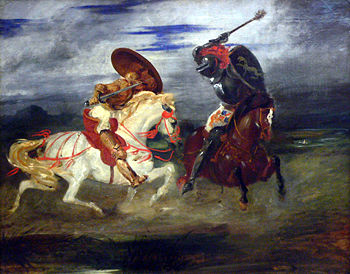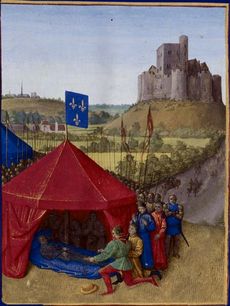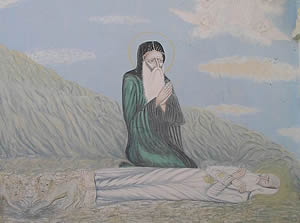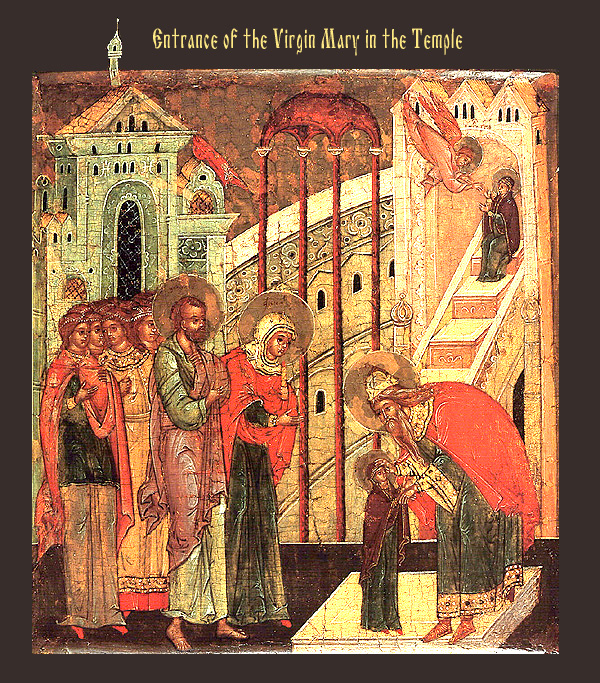Deconstruction and Proof Texts
From a comment posted to another blog:
Indeed: How could we Orthodox base our authority on the scriptures, when we wrote the scriptures? Rather, the reverse is true. The scriptures derive such authority as they have from us. Indeed, were it not so, the Ecumenical Councils would have no meaning, for in them we articulated the canons of the scriptures. But in reality, the scriptures are the icon of Christ, and so we’re not concerned so much with ‘authority’ in some quasi-Roman-Catholic sense, but with the Incarnation, with the Scriptures as revelation of the Incarnate One. For us, the Scriptures are in this sense an interactive call to theosis, to deification, to union with God. This is their purpose and their significance to us, as indeed are all things in Holy Orthodoxy, but a means to that one end. For us the question is not “what is true?” as much as “how may I be deified?”, because Orthodoxy is not a belief system – it’s an asceticism.
How could we Orthodox base our authority on the scriptures, when we wrote the scriptures? Rather, the reverse is true. |
On your last point, concerning those who do not follow Orthodox epistemology nonetheless trying to cobble together proof texts from our writings to refute that very epistemology, it is indeed parasitical. Pure invention would be better suited to their underlying assumptions – why don’t they write their own books? The question is a historical one, as much as an ecclesiological and epistemological one. Fundamentally, they consider themselves the heirs of the apostles and so of holy writ, and attribute therefore to their own tribe and mentality those holy men who had no such notions as they hold, and then position them to try to reconcile them or admit confusion.
We are debating with people who first begin with the notion that the Church is something general and non-specific, and then proceed to claim historical continuity with it’s fathers and texts. Their history, and indeed historiographical method is bunko. If that falls through their fingers, nothing they say now about doctrine or theory matters at all. Theirs is, at it’s heart, the error of the literary deconstructionist. It’s as if one of us wrote an epic poem, and they think they know better than the author what it means. We write books, and they take those texts and presume to tell us what we mean. And we say,
Orthodoxy is not a belief system – it’s an asceticism. |
No, we also have the original author’s letters, and his disciple’s letters, and the continuity of discussion (e.g. the liturgy) in which they lived and breathed, the very tradition into which they were writing and the language of metaphors and references and history they were speaking – the grammar of their faith, and we have their prayers, and their lives, and their disciples prayers and lives, and their mentors’ prayers and lives and letters and books, and we have the decisions of the councils in which they participated, and the succession in which they participated, and even the languages in which they wrote and spoke and prayed, and indeed the very physical churches in which they served and prayed and did works, and their childrens’ childrens’ children unto ages that they sired in the faith, and the testimonies of holy men to the meaning and significance of their teachings in their lives, and miracles, appearances, visions, visitations, healings, and answered prayers following the veneration of these men, which follow upon and proceed because of this understanding of their thinking, and our homes are filled with their icons, and their names upon our calendars and our lips – indeed our children are given their names and keep their name days as the days of their new birth, and indeed Bishops are tonsured in their names, and Churches consecrated in their names, and monastic brotherhoods proceed in their names and go ahead before us into glorification and return to us with answered prayers and signs and wonders bidding us follow still, so that we see the line of our people stretching back to Him who made us and ahead to those who live in his uncreated Energies, deified and divinized.
But here they offer, “yes, but we know what the writings really mean”, which is nothing else than what the gnostics of old offered up against the Orthodox: that they were wiser than the apostles, and possessed the higher intuition, the illumined insight, the greater connection to the spiritual thread of God, and had no need of the Incarnate Christ in whom all these fathers subsist, since the secrets of their minds are superior. This is the character of those who offer us the ulterior wisdom of their own minds, and bid us look away from the path of light to their own ‘enlightenment’.
But we are the elder brother. They cannot speak of Christ or Christianity or fathers or Church or scripture except by us. |
But we are the elder brother. They cannot speak of Christ or Christianity or fathers or Church or scripture except by us. Ours is the language and history of heaven come to earth, and so it’s nonsense for us to reverse this order – or rather it’s Babel, the attempt of earth to attain heaven, as if to own it and possess it and situate it within our own religious framework and assumptions and culture. God forbid. And God save us by the prayers of the fathers who led and lead us still, who are not dead, and not silent, and not impotent, but continue to save us, and speak to us, and teach us, as we listen to their voices and receive grace through them, drowning out the distortions of their false followers who presume to tear them away from this unbroken tradition – what you call our epistemology, which is really much more – and so to sever us as well.
How can we listen to the heterodox prattle about writings and teachings when, regardless of all else, they are not of us, not of those whose writings they handle so roughly? As the one who led me said, “If they say they follow the Apostles and the Saints, then let them join their Church.”
Key excerpts from the [Original Comment Source]:
You believe that the Pope, the Apostles and the Bible are somehow “infallible.” I believe that the prophets, Apostles, and saints of all ages, up until this exact minute, have experienced revelation, which is glorification.
I follow the Orthodox Church, whose authority is based not upon Scripture or Liturgy per se, but upon real revelation, which is direct, noetic experience of the divine.
Without glorification, Christianity becomes a “religion.” A set of rules and maxims which are dictated to man by mere men.
The [scriptures are] written by those who are inspired by their experiences of glorification to write words that lead (in the context of the Church and individual spiritual fatherhood) others to the selfsame experience of God.
 Increasingly, I find dissidence and social resistance are considered, among the religious, to be either un-Christian, or somehow an unpleasant aspect of Christianity that is best swept under the rug along with keeping the fasts. Actually, fasting and resistance to the world, in fact open warfare with the world, are related. The very purpose of asceticism is to save us – from the world and unto God. So often, you’ll find those who don’t do one (e.g. fasting or resisting the world) don’t appreciate the other. I’ll be called judgmental for that, but I really don’t care – I only care, at this point, if it’s true. But what is true religion? To relieve the poor and keep oneself unstained by the world. Increasingly, I’m thinking that all of orthopraxy (or orthopraxis for you misguided sticklers) is summed up in that statement.
Increasingly, I find dissidence and social resistance are considered, among the religious, to be either un-Christian, or somehow an unpleasant aspect of Christianity that is best swept under the rug along with keeping the fasts. Actually, fasting and resistance to the world, in fact open warfare with the world, are related. The very purpose of asceticism is to save us – from the world and unto God. So often, you’ll find those who don’t do one (e.g. fasting or resisting the world) don’t appreciate the other. I’ll be called judgmental for that, but I really don’t care – I only care, at this point, if it’s true. But what is true religion? To relieve the poor and keep oneself unstained by the world. Increasingly, I’m thinking that all of orthopraxy (or orthopraxis for you misguided sticklers) is summed up in that statement. One of the most basic forms of attack, that helps us solidify our sense of resistance and rejection of the world (imo), is boycotting. You can boycott fear in a workplace (like I did), or you can do it in defense of others.
One of the most basic forms of attack, that helps us solidify our sense of resistance and rejection of the world (imo), is boycotting. You can boycott fear in a workplace (like I did), or you can do it in defense of others. Amazingly, you’ll even hear that boycotts is ‘participation in the world’ instead of resistance to it! You’ll hear it in the car on the way to Walmart, ironically, but that’s what’ll be said. In the end, the lines are drawn not between those who attend our churches and those who don’t, but rather between those who worship at the altars of the world and those who smash them, because they’re altars of human sacrifice. You’ll hear all kinds of “but we should be tolerant” until you realize they’re chewing on human bones.
Amazingly, you’ll even hear that boycotts is ‘participation in the world’ instead of resistance to it! You’ll hear it in the car on the way to Walmart, ironically, but that’s what’ll be said. In the end, the lines are drawn not between those who attend our churches and those who don’t, but rather between those who worship at the altars of the world and those who smash them, because they’re altars of human sacrifice. You’ll hear all kinds of “but we should be tolerant” until you realize they’re chewing on human bones. Grasp the depth of Blessed Theophylact’s point: “While the activity of the demons operates, even though we appear to be speaking, we are not.” Consider what assaults us through the channels, airwaves, and other media of contemporary life: the messages appear to be human speech but actually they are demonic chatter and lies. Think about the distortion of truth that claims to be communication in the contemporary world. The assault is massive. [source forgotten]
Grasp the depth of Blessed Theophylact’s point: “While the activity of the demons operates, even though we appear to be speaking, we are not.” Consider what assaults us through the channels, airwaves, and other media of contemporary life: the messages appear to be human speech but actually they are demonic chatter and lies. Think about the distortion of truth that claims to be communication in the contemporary world. The assault is massive. [source forgotten] This is, in fact, the theme of every zombie-genre film from 28-Days to I am Legend: a race of people who are sick and who turn on any one who is not sick.
This is, in fact, the theme of every zombie-genre film from 28-Days to I am Legend: a race of people who are sick and who turn on any one who is not sick. This is the day of the Entrance of the Theotokos into the Temple.Fulfilling their vow to God, Sts. Joachim and Anna, her holy parents, presented Mary at three years old at the temple, where she would live as virgin for nine years, until her Betrothal to St. Joseph. The High Priest Zacharias blessed her with these words: “The Lord has glorified thy name in every generation; it is in thee that He will reveal the Redemption that he has prepared for his people in the last days.” He then led her into the Holy of Holies, where the High Priest alone may enter, and only once a year on the Day of Atonement.
This is the day of the Entrance of the Theotokos into the Temple.Fulfilling their vow to God, Sts. Joachim and Anna, her holy parents, presented Mary at three years old at the temple, where she would live as virgin for nine years, until her Betrothal to St. Joseph. The High Priest Zacharias blessed her with these words: “The Lord has glorified thy name in every generation; it is in thee that He will reveal the Redemption that he has prepared for his people in the last days.” He then led her into the Holy of Holies, where the High Priest alone may enter, and only once a year on the Day of Atonement. Love not the world, nor the things that are in the world. If any man loves the world, the love of the Father is not in him. For all that is in the world, the lust of the flesh, and the lust of the eyes, and the pride of life, is not of the Father, but is of the world. And the world is passing away, and the lust of it: but he that does the will of God abides forever.
Love not the world, nor the things that are in the world. If any man loves the world, the love of the Father is not in him. For all that is in the world, the lust of the flesh, and the lust of the eyes, and the pride of life, is not of the Father, but is of the world. And the world is passing away, and the lust of it: but he that does the will of God abides forever.